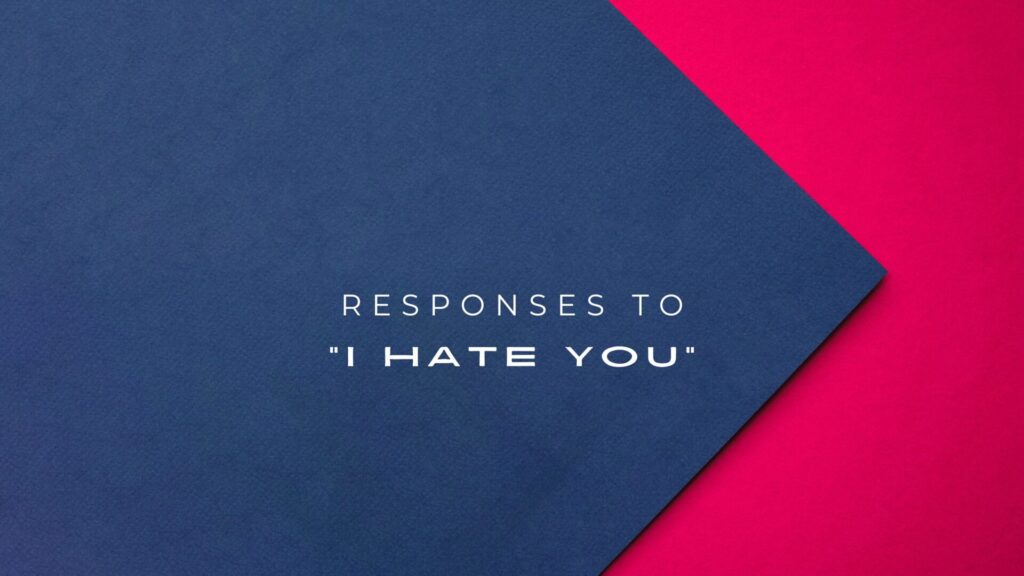Handle “I Hate You” with Confidence : 200+ Responses

Emotions are a complex web of feelings and reactions that can often lead to misunderstandings. One of the most charged phrases someone can utter is “I Hate You.” These three words carry a weight that can break hearts, end relationships, and leave lasting scars. But what do these words truly mean, and how should we handle them when they come our way? Let’s dive deep into understanding and navigating this emotional minefield.
Understanding the Phrase “I Hate You”
- Surface-Level Interpretation
At first glance, “I Hate You” seems straightforward—expressing intense dislike or anger toward someone. It might come out during a heated argument or in moments of frustration. However, taking these words at face value can be misleading.
- Deeper Emotional Context
“I Hate You” is often a mask for deeper, more complex emotions. It might be a way to express pain, disappointment, or even love in a twisted form. Sometimes, it’s an outcry for attention or a desperate attempt to communicate hard-to-articulate feelings.
Common Scenarios Where “I Hate You” Is Used
- Relationships and Breakups
“I Hate You” can surface during intense fights or breakups in romantic relationships. It may not always reflect true feelings but rather a temporary state of mind fueled by hurt and anger.
- Family Conflicts
Family dynamics can be challenging, and misunderstandings can escalate quickly. “I Hate You” might be shouted during a heated argument between siblings, parents, and children.
- Friendships and Social Dynamics
Friends, too, can have fallingouts. Miscommunications, jealousy, or betrayal can lead to someone saying, “I Hate You,” even if they don’t truly mean it.

200+ Responses to “I Hate You”
Empathetic Responses
- I can tell you’re frustrated. Do you want to talk about what’s bothering you?
- It sounds like you’re going through a lot right now. How can I support you?
- I understand that you’re upset. I’m here to listen if you need to vent.
- I’m sorry you’re feeling this way. Your feelings are important to me.
- It must be tough to feel like this. Let’s see if we can work through it together.
- I can sense that you’re hurt. Is there something specific that’s making you feel this way?
- I get that you’re angry right now. I want to understand what’s causing this.
- I’m here for you, even if you’re feeling this way. Let’s try to talk it out.
- I see that you’re upset. Let’s find a way to address what’s going on.
- It sounds like you’re in a lot of pain. How can we work through this together?
Defensive Responses
- I don’t think that’s a fair assessment. Can we talk about what happened?
- That seems pretty extreme. Is there something specific that made you feel this way?
- I’m not sure why you’d say that. Can we discuss what’s going on?
- I don’t understand why you’re saying that. What did I do to upset you?
- That’s a pretty strong reaction. I’d like to know what’s behind it.
- I don’t think I deserve that. Can we clarify what’s causing this?
- I feel like there’s more to this. Can we talk about what’s bothering you?
- That’s a harsh way to put it. What exactly did I do that led to this?
- I’m not sure I agree with that. Can you explain why you feel this way?
- I’m a bit taken aback by that. Let’s discuss what led to this feeling.
Apologetic Responses
- I’m sorry if I did something to upset you. Let’s talk about it.
- I didn’t mean to hurt you. Please let me know how I can make things right.
- I’m genuinely sorry for any pain I caused. Can we discuss this further?
- I regret that you’re feeling this way. What can I do to help fix this?
- I apologize if my actions led to this. How can we move forward?
- I’m sorry for any hurt I may have caused. Let’s find a way to resolve this.
- I didn’t realize I was causing you distress. I’m sorry.
- I’m sorry if I’ve hurt you. What can I do to make amends?
- I apologize for upsetting you. Can we talk about what happened?
- I’m truly sorry for my part in this. Let’s work on finding a solution together.
Humorous Responses
- Wow, I didn’t know I was such a villain! Should I start working on my evil laugh?
- Hate is a strong word. How about ‘not my favorite person’ instead?
- I guess I’m not winning ‘Friend of the Year’ with that comment!
- Oh no, my plan to make you laugh backfired!
- This means no more high-fives, huh?
- Hey, at least you’re honest. I’ll take it as a compliment in disguise!
- I’m sorry; I didn’t mean to steal your spot as the family favorite.
- Guess I’m off your holiday card list this year!
- Unless you’re talking about my cooking, I’ll try not to take that personally.
- Oh, come on, everyone needs a good villain story occasionally!
Neutral Responses
- Alright, I hear what you’re saying.
- Okay, we can move on if that’s how you feel.
- You got it. Let me know if you want to talk later.
- Understood. Let’s take a break for now.
- Okay, I’ll give you some space.
- Noted. We can discuss this another time.
- Alright, I’ll respect your feelings.
- I see. We don’t have to talk right now.
- Okay, I understand your position.
- Alright, let’s leave it here for now.
Confrontational Responses
- That’s quite a statement. What exactly is making you feel this way?
- I don’t think that’s fair. Can you explain why you’re so upset?
- Why would you say that? Is there something specific that’s bothering you?
- That’s a strong reaction. Let’s get to the root of this issue.
- If you feel this way, we need to talk about it. What’s the problem?
- That’s pretty harsh. Can you tell me what’s behind this anger?
- I’m not sure I deserve that. Let’s have an honest conversation about why you feel this way.
- What’s the real issue here? Let’s address it directly.
- That’s a serious accusation. Let’s talk about what’s going on.
- If you’re feeling this strongly, we must discuss what led to this.
Supportive Responses
- I’m here for you, even if you’re feeling this way. Let’s figure out what’s going on.
- I know you’re upset. How can I support you right now?
- It sounds like you’re going through something tough. Let’s talk about it if you’re up for it.
- I want to understand what’s making you feel this way. How can I help?
- I’m sorry you’re feeling this way. I’m here to listen and support you.
- I care about you, and I want to help. Can we talk about what’s bothering you?
- Even though you’re angry, I’m here to support you. Let’s try to work through this.
- It’s okay to feel how you’re feeling. How can I be there for you?
- I understand that you’re upset. Let’s work together to resolve whatever is going on.
- I’m here to help in any way I can. Let’s talk about what’s causing these feelings.
Dismissive Responses
- Alright, if that’s how you feel. I guess we don’t need to discuss it further.
- Okay, they are noted. Let’s move on from this.
- That’s your opinion. I’ll just leave it at that.
- You got it. We don’t have to talk about it if you don’t want to.
- Alright, I see how it is. Let’s not dwell on it.
- Fine, if that’s what you think. Let’s change the topic.
- Okay, let’s just drop it then.
- Understood. We don’t need to make a big deal out of this.
- I hear you. Let’s not focus on this right now.
- If that’s your view, I’ll just give you space.
Reflective Responses
- I hear that you’re upset. What do you think is really behind those feelings?
- You seem angry. Can you help me understand what’s at the core of this?
- It sounds like you’re struggling with something. What do you think is causing these emotions?
- I’m getting that you’re feeling a lot right now. What do you think led to this?
- You’re expressing a lot of anger. What do you think is driving these feelings?
- I understand you’re upset. Can we explore what’s bothering you?
- It sounds like you’re hurt. What’s the deeper issue here?
- I can sense a lot of emotion. What do you believe is the root cause?
- You seem frustrated. What might be triggering this reaction?
- I see that you’re feeling strongly. What do you think is the underlying reason for this?
Affectionate Responses
- I know you’re angry, but I still care about you. Let’s work through this together.
- Even if you’re feeling this way, you’re important to me. I want to help fix things.
- I understand you’re upset, but my feelings for you haven’t changed. Let’s talk about it.
- I’m here for you, no matter what. Let’s figure out how to move forward.
- Even though you’re angry, I still value our relationship. Can we talk about what’s wrong?
- I know it’s hard right now, but I want to work through this with you. You’re still important to me.
- I care about you deeply and want to understand what’s causing this. Let’s work through it.
- Even if you’re feeling this way, my support for you hasn’t wavered. Let’s address what’s going on.
- I’m sorry you feel this way, but I’m here to help. Let’s try to resolve it together.
- I understand you’re hurting, but I still care about you and want to find a way to make things better.
Agreeing Responses
- I can see why you might feel that way.
- If that’s how you feel, I won’t argue with it.
- I understand where you’re coming from. Maybe we need some space.
- It sounds like you’ve made up your mind. I’ll respect that.
- I can see why you might be feeling that way. Let’s take a break.
- Okay, I get it. Let’s give this some time.
- If you feel that strongly, I won’t push it. Let’s step back for now.
- I understand. If that’s how you feel, we can deal with it later.
- It seems like you’re set on this. I’ll give you some space.
- If you feel that way, we can discuss it again.
Shock/Surprise Responses
- Wow, that’s a bit unexpected. What brought this on?
- I’m really surprised by that. Is there something specific that made you feel this way?
- I didn’t see that coming. Can you help me understand what’s going on?
- That’s quite a shock. What happened to make you feel like this?
- That takes me aback. What’s the reason behind these feelings?
- I didn’t expect this reaction. Can we talk about what’s causing it?
- That’s a surprising thing to say. What led to these feelings?
- I’m genuinely surprised by your comment. What’s making you feel this way?
- Wow, that’s not what I expected. What’s behind this sudden change?
- I’m a bit shocked by that. Can you explain what’s making you feel this way?
Clarifying Responses
- Can you tell me more about what specifically upset you?
- What exactly did I do that made you feel this way?
- I want to understand. What’s the main issue here?
- Could you help me understand what’s causing these feelings?
- What led to this strong reaction? Let’s clarify what happened.
- Can you explain what’s bothering you in more detail?
- I’m not sure what caused this. Can you give me some specifics?
- What part of my actions or words triggered this response?
- Can you provide more details about why you feel this way?
- I want to get to the bottom of this. What’s the real reason behind your feelings?
Philosophical Responses
- Feelings of hate can be intense. What do you think is the root of such strong emotions?
- Hate is a powerful word. How do you think it reflects what’s happening between us?
- It’s interesting how emotions can shift so drastically. What do you think that means for us?
- Sometimes, our feelings are a reflection of deeper issues. What might those be in this case?
- Hate often comes from unresolved issues. What might those be for us?
- Emotions like hate can be revealing. What do you think they tell us about our relationship?
- What does it mean to feel this way? How can we address these feelings?
- Hate can be a sign of deeper conflict. What should we explore to resolve this?
- Strong emotions often point to something deeper. What do you think is at the core of this?
- Sometimes, extreme emotions are a way of signaling deeper concerns. What might those be?
Reflective Listening
- It sounds like you’re feeling really angry. Is that right?
- So you’re saying you hate me because of something specific? Can you elaborate on that?
- You seem very upset. Is there something in particular that’s causing this?
- It seems like you’re feeling a lot of frustration right now. What’s the source of that?
- I hear that you’re feeling a lot of anger. Can you help me understand why?
- You’re expressing a lot of strong feelings. Can you reflect on what led to this?
- It sounds like something deeper is making you feel this way. What do you think it is?
- I’m getting that you’re hurt. Can you share more about what’s causing these feelings?
- It seems like you’re dealing with some intense emotions. What’s at the heart of them?
- You’re feeling a lot of anger. What do you think is driving these emotions?
Playful Responses
- Hate? I didn’t know I was that good at making enemies!
- Does this mean I’m off your ‘friends’ list? What did I do this time?
- I should work on my charm, then! What’s got you feeling this way?
- Wow, that’s a strong reaction! Did I forget to send you a birthday card or something?
- Hate? I hope you’re not plotting any elaborate revenge schemes!
- Uh-oh, did I accidentally step on your favorite toy or something?
- Yikes! That’s a pretty intense feeling. Can I do something to make things better?
- I see we’re taking the dramatic route today! What’s the story behind it?
- If this were a soap opera, I’d be the villain now. What’s the plot twist?
- I didn’t know I was starring in a drama! What’s the reason for the plot twist?
Gratitude Responses
- Thank you for being honest with me, even if it’s tough to hear.
- I appreciate you sharing your feelings. It helps me understand where we stand.
- Thanks for expressing how you feel. It gives us a chance to address it.
- I’m grateful for your honesty. Let’s figure out what’s causing these feelings.
- Thank you for telling me how you feel. We need to talk about it.
- I appreciate your openness. Let’s work on resolving what’s causing this.
- Thanks for being upfront about your feelings. It’s important to address this.
- I value your honesty. Let’s use this as a chance to improve our relationship.
- Thank you for being direct. It helps me understand how to move forward.
- I’m grateful you’re sharing this with me. Let’s work through what’s bothering you.
Inquisitive Responses
- What’s making you feel this way? Can you help me understand better?
- I’d like to know more about why you’re feeling this way. What triggered it?
- Can you tell me what’s at the heart of these feelings? What’s the issue?
- What specific events led to this reaction? I’d like to understand more.
- What do you think is behind this strong emotion? Can we talk it through?
- Can you help me understand what’s causing you to feel this way?
- What’s the main reason behind your feelings? I’m interested in hearing more.
- What led to this intense reaction? I want to get more insight into what’s happening.
- Can you share more about what’s bothering you? What’s the underlying issue?
- I’m curious about what’s causing these feelings. Can you explain what’s going on?
Dismissive Responses
- Alright, if that’s how you feel. I’m not going to push it.
- Okay, I get it. Let’s just move on.
- Fine, if that’s your stance. We don’t need to dwell on it.
- I got it. We can just drop this for now.
- Alright, I’ll respect your space. Let’s not make a big deal out of it.
- Okay, they are noted. We don’t have to talk about it further.
- Let’s not drag this out if that’s how you feel.
- Understood. Let’s leave it here and move on.
- Alright, I see where you’re coming from. We can drop this.
- Okay, I hear you. We don’t need to make this a bigger issue.
Support-Seeking Responses
- I’m not sure how to handle this. Can you tell me what you need from me right now?
- I want to support you, but I’m not sure how. Can you guide me through the process?
- How can I be of help in this situation? What do you need from me?
- I want to understand how I can support you better. What can I do to help?
- I’m here to help, but I need to know how. What do you need from me right now?
- Can you let me know what kind of support you’re looking for? I want to be there for you.
- I want to offer support, but I’m unsure what would be most helpful. Can you advise?
- How can I assist you in working through this? What do you need from me?
- I want to be supportive, but I need your input. What can I do to improve things?
- I’m here for you, but I need to know how best to support you. What do you need right now?
Psychological Impact of Hearing “I Hate You”
Emotional Reactions
- Shock and Confusion
Hearing “I Hate You” can be shocking, especially unexpected. It can confuse the recipient, wondering what they did to deserve such harsh words.
- Anger and Resentment
Anger is a common reaction to hearing “I Hate You.” It can quickly become resentment, especially if the person feels unfairly targeted.
Long-Term Effects on Self-Esteem and Mental Health
- Anxiety and Depression
Repeated exposure to negative statements like “I Hate You” can contribute to anxiety and depression. The constant negativity can make someone question their self-worth and lead to feelings of hopelessness.
- Trust Issues
Hearing “I Hate You” from someone close can create trust issues. Opening up to or trusting others fully can be challenging, fearing similar rejection or harsh words.
Constructive Ways to Handle the Situation
- Communicating Openly
Open communication is crucial. Instead of retaliating with hurtful words, express how the statement made you feel. This can help de-escalate the situation and lead to a more productive conversation.
- Setting Boundaries
If “I Hate You” is a recurring theme, it might be necessary to set boundaries. Let the other person know that such language is unacceptable and that more respectful communication is needed.
Why People Say “I Hate You”
Projection of Inner Turmoil
- Stress and Overwhelm
Sometimes, “I Hate You” is a projection of one’s internal struggles. When people are stressed, they might lash out at others, even if the anger is misplaced.
Cry for Attention or Help
- Insecurity and Vulnerability
“I Hate You” can sometimes be a cry for attention, a way to express vulnerability or insecurity, or a way to feel neglected. The person may use harsh words to provoke a reaction.
Moving Forward After Hearing “I Hate You”
Healing and Forgiveness
- Personal Growth
Dealing with the aftermath of “I Hate You” involves personal growth. It’s an opportunity to reflect on your actions and work on improving yourself.
- Rebuilding Trust
If the relationship is worth saving, both parties must work on rebuilding trust. This can be a long process, but essential for a healthy relationship.
Letting Go and Moving On
- Acceptance and Closure
Sometimes, the best course of action is to let go. Accept that the relationship may not be salvageable and find closure. It’s a painful process but can lead to personal freedom and peace.
Preventing “I Hate You” in the Future
Building Healthy Communication Skills
- Active Listening
Active listening can prevent misunderstandings. By fully engaging with the speaker, you can better understand their feelings and concerns, reducing the likelihood of conflicts.
- Empathy and Understanding
Empathy is key in any relationship. Understanding the other person’s perspective can prevent the buildup of negative emotions that might lead to saying, “I Hate You.”
Strengthening Relationships
- Regular Check-Ins
Regular check-ins with loved ones can help maintain a healthy relationship. It’s a chance to discuss feelings and resolve issues before they escalate.
- Conflict Resolution Strategies
Learning conflict resolution strategies can be a lifesaver. It equips you with the tools to handle disagreements constructively without using hurtful words.
Conclusion
In moments when someone says, “I hate you,” it can be challenging to maintain composure and respond thoughtfully. However, armed with the right responses and a confident mindset, you can turn these situations into opportunities for personal growth and understanding. Remember, it’s not just about what you say but how you handle yourself in the face of negativity. You can defuse tension and strengthen relationships by staying calm, empathetic, and assertive. If you’re looking for more guidance on handling difficult conversations,
check out our comprehensive guide on:
Dealing with “You Don’t Love Me Anymore”: 200+ Responses
FAQs
Q. How can I cope with the hurt from hearing “I Hate You”?
Take time to process your emotions, seek support from friends or a therapist, and focus on self-care.
Q. What should I do if I said “I Hate You” in anger?
Apologize sincerely, explain the context, and find healthier ways to express your feelings.
Q. Can a relationship recover after someone says “I Hate You”?
Yes, recovery is possible with open communication, mutual understanding, and a willingness to work through issues.
Q. How do I communicate effectively to avoid saying “I Hate You”?
Practice active listening, express your feelings calmly, and use “I” statements to avoid blame.
Q. Is it normal to feel guilty after saying “I Hate You”?
Yes, it’s normal. Reflecting on why you said it and making amends can help alleviate guilt.






